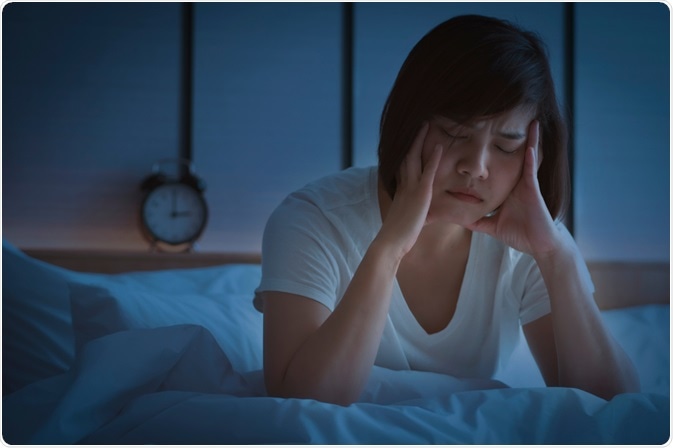
Image Credit: chayapat karnnet / Shutterstock.com
A brief overview of insomnia
A person suffering from insomnia can experience significant problems in their quality of life. It can make it difficult to focus, pay attention, and perform as they normally do during the day. These are the most common symptoms of insomnia:
- It is difficult to get to sleep
- You can wake up throughout the night
- Wake up early in the morning
- Tiredness and irritability
- Difficulty in functioning as normal during the day
Finding out if there are any underlying causes for insomnia is the first step in treating it. If there is an underlying medical condition that causes insomnia, it can be treated without the need for further medical intervention. Below are some other options that healthcare professionals might consider.
Good sleep hygiene
Patients will be advised by their doctor on how they can improve their sleep quality at home. This is called “sleep hygiene” and healthcare providers will recommend that patients try this method for at least three to four weeks. Then, they will follow up with their patients in order to see if their insomnia symptoms have improved.
Sleep hygiene involves:
- Establishing a set time for bed and wake up will help you to have a consistent sleeping schedule.
- Relax before bed by taking a hot bath, reading, or listening to soothing music.
- You should ensure that the environment in which you sleep is comfortable, both in terms of temperature and light.
- Do not nap during the day.
- Avoid caffeine, alcohol, and nicotine late at night.
- Regular exercise, but not at least for four hours before going to bed.
- Avoid spicy or heavy foods at night.
- You should only use the bedroom to sleep or for intimacy.
- Do not check the clock as it can frustrate and make it difficult to fall asleep.
- Turn off or remove any screen-based electronic device, such as televisions or phones, to make your brain more alert.
5 Quick Ways
Cognitive and behavioral therapy
A doctor might recommend cognitive and behavioral therapy for long-term insomnia. This therapy aims to change any unhelpful thoughts and behaviors that may be contributing to insomnia.
You may also consider other behavioral therapies:
- Stimulus control therapy is a method that helps people associate their bedroom with sleep and establish a consistent sleeping pattern.
- A person can sleep restriction therapy is a method of limiting the time they spend in bed, so that they only go to bed when they are asleep. This creates mild sleep deprivation. As sleeping improves, so does sleep time.
- Paradoxical intention is a state of being awake while avoiding falling asleep. This works only if someone has difficulty falling asleep, rather than a problem maintaining sleep.
- Relaxation training is a way to relax and reduce tension.
Pharmacotherapy
If chronic insomnia is severe, or if cognitive and behavioral therapies have not worked, healthcare providers might recommend a sleeping pill. These tablets are not effective in treating the root cause and can be harmful long-term.
Doctors will usually prescribe the lowest effective dosage for sleeping tablets, which is typically no more than one week. Side effects of sleeping tablets include feeling hungover or daytime drowsiness. The preferred treatment for insomnia is short-acting benzodiazepines, or “Z medicines”.
Benzodiazepines
Benzodiazepines, also known as tranquilizers, are used to reduce anxiety, relax, and induce sleep. This medication can cause dependency so it is important to only prescribe short-acting, short-term versions. Temazepam is the most common benzodiazepine prescribed for insomnia.
Z medicines
Z medicines, a type of newer short-acting drug, work in a similar manner to benzodiazepines. Z medicines include zaleplon and zolpidem.
Zaleplon can be used to help people who have difficulty falling asleep. Zolpidem is used for severe insomnia and debilitating sleeplessness. Zopiclone can be used to treat insomnia that causes severe distress, such as difficulty falling asleep or waking up during the night.
Antidepressants
Antidepressants can sometimes be prescribed for insomnia, especially if there is a history or depression.
Melatonin
Melatonin-containing medicines can be used to treat insomnia symptoms for as long as 26 weeks in elderly people. This hormone is naturally found in the body and regulates the circadian rhythm or sleep cycle.
Complementary therapies
Some healthcare professionals may recommend homeopathy or acupuncture as complementary treatments for insomnia. There is not much evidence that these treatments are effective.

